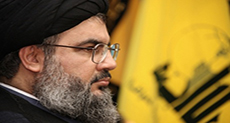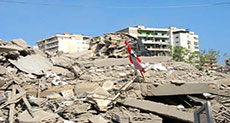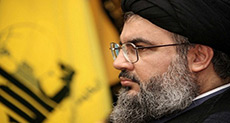Vast majority of “Israelis” consider war a failure, “Israelis” build more burrows ahead of `next war`
Source: AFP, 13-2-2007
NAHARIYA, "Israel": Six months after the guns fell silent in Lebanon, northern "Israel" is still busily preparing new bomb shelters and repairing damaged facilities in anticipation of the next war with Hizbullah. In Kyriat Shmona, a town directly on the border with Lebanon that was battered by more than 800 Hizbullah rockets during fighting between July 12 and August 14, local authorities are scrambling to construct enough subterranean room for everyone.
"We only have enough shelters for 60 percent of the 24,000 people living in the town and they need to be furnished with air conditioners, televisions and Internet connections so people can live normally for a long time," said Mayor Haim Barbibay.
He admitted that fitting out and building additional shelters, bankrolled mostly by private funds, will not be complete before the end of the year.
"The next conflict will affect the whole country and the population will inevitably be displaced, as happened last summer," Barbibay said.
Nearly 500,000 "Israelis" living in the north fled further south during the war; 1 million Lebanese were forced from their homes.
Already entrenched in the northern "Israeli" mindset, expectations of an approaching war intensified after National Infrastructure Minister Benjamin Ben-Eliezer`s warning that "Israel" should prepare for fresh conflict this year.
The area is still recovering from the damage incurred by more than 4,000 Hizbullah rocket attacks during the conflict with the resistance group which killed more than 1,200 people in Lebanon, most of them civilians, and at least 160 "Israelis", most of them soldiers.
The vast majority of "Israelis" consider the war a failure for the military`s inability to stop the rocket attacks and recover two soldiers whose capture by Hizbullah fighters served as a pretext for the conflict.
Underscoring what millions in the Zionist state see as a constant threat in the north, last week "Israeli" and Lebanese soldiers exchanged cross-border fire for the first time in decades.
Haifa, the metropolitan capital of northern "Israel", is also preparing for a nationwide conflict, says Shmuel Gants, director general of the municipality, who likewise admits that the number of shelters in the city is not enough.
"We are putting the emphasis on preparing the population psychologically that they should stay put during a crisis," he said.
At a hospital in the Mediterranean holiday resort of Nahariya, also within rocket range of South Lebanon, two rooms smashed by rockets last summer have yet to be repaired.
Oxygen units are still hanging from walls, cracked by the rockets. Rolls of paper remain in place in the bathrooms, despite rubble and metal bars strewn on the floor.
Fortunately, patients had been transferred to an underground room before the attack, built so that the hospital could function in time of war.
"Ten years ago, when we decided to build the underground hospital, people thought we were crazy but all the hospitals in the region envy us," said its spokesman, Zeev Farber.
"We need millions of dollars and time to build underground installations," said Kalin Shapira, deputy director of the hospital in Safed, a town also subject to war-time rocket attacks.
Electrical installations for medical equipment are starting to be installed in underground rooms reserved for archives and laundry rooms. The work has become more urgent in the context of warnings from the head of "Israeli" military intelligence, Amos Yadlin, who said last month that Hizbullah is replenishing its arsenal.




